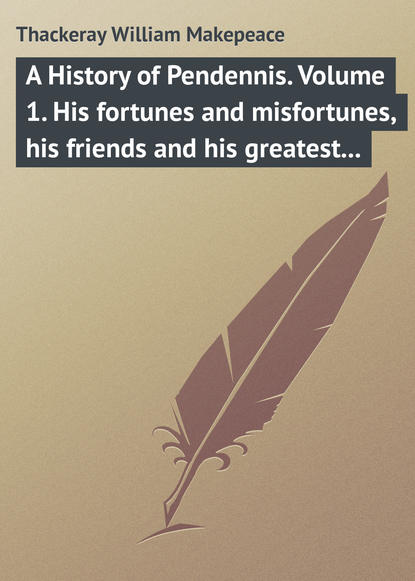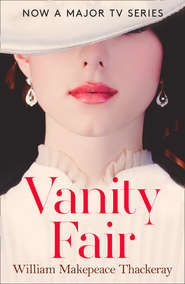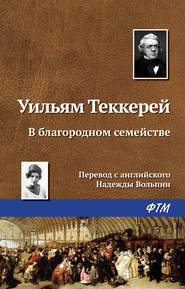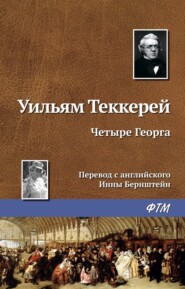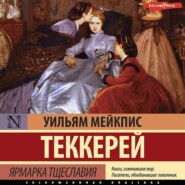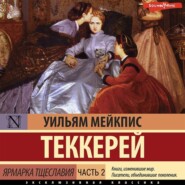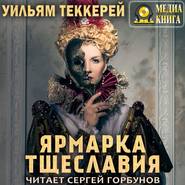По всем вопросам обращайтесь на: info@litportal.ru
(©) 2003-2024.
✖
A History of Pendennis. Volume 1. His fortunes and misfortunes, his friends and his greatest enemy
Настройки чтения
Размер шрифта
Высота строк
Поля
With these amusements, in rather too great plenty, it must not be assumed that Pen neglected his studies altogether. He had a natural taste for reading every possible kind of book which did not fall into his school-course. It was only when they forced his head into the waters of knowledge that he refused to drink. He devoured all the books at home, from Inchbald's Theater to White's Farriery; he ransacked the neighboring book-cases. He found at Clavering an old cargo of French novels, which he read with all his might; and he would sit for hours perched upon the topmost bar of Doctor Portman's library steps, with a folio on his knees, whether it were Hackluyt's Travels, Hobbes's Leviathan, Augustini Opera, or Chaucer's Poems. He and the vicar were very good friends, and from his reverence, Pen learned that honest taste for port wine which distinguished him through life. And as for that dear, good woman, Mrs. Portman, who was not in the least jealous, though her doctor avowed himself in love with Mrs. Pendennis, whom he pronounced to be by far the finest lady in the county – all her grief was, as she looked up fondly at Pen perched on the book-ladder, that her daughter Minny was too old for him – as indeed she was; Miss Mira Portman being at that period only two years younger than Pen's mother, and weighing as much as Pen and Mrs. Pendennis together.
Are these details insipid? Look back, good friend, at your own youth, and ask how was that? I like to think of a well-nurtured boy, brave and gentle, warm-hearted and loving, and looking the world in the face with kind, honest eyes. What bright colors it wore then, and how you enjoyed it! A man has not many years of such time. He does not know them while they are with him. It is only when they are passed long away that he remembers how dear and happy they were.
In order to keep Mr. Pen from indulging in that idleness of which his friend the doctor of the Cistercians had prophesied such awful consequences, Mr. Smirke, Dr. Portman's curate, was engaged at a liberal salary, to walk or ride over from Clavering, and pass several hours daily with the young gentleman. Smirke was a man perfectly faultless at a tea-table, wore a curl on his fair forehead, and tied his neck-cloth with a melancholy grace. He was a decent scholar and mathematician, and taught Pen as much as the lad was ever disposed to learn, which was not much. For Pen had soon taken the measure of his tutor, who, when he came riding into the court-yard at Fairoaks on his pony, turned out his toes so absurdly, and left such a gap between his knees and the saddle, that it was impossible for any lad endowed with a sense of humor to respect such an equestrian. He nearly killed Smirke with terror by putting him on his mare, and taking him a ride over a common, where the county fox-hounds (then hunted by that stanch old sportsman, Mr. Hardhead, of Dumplingbeare) happened to meet. Mr. Smirke, on Pen's mare, Rebecca (she was named after Pen's favorite heroine, the daughter of Isaac of York), astounded the hounds as much as he disgusted the huntsman, laming one of the former by persisting in riding among the pack, and receiving a speech from the latter, more remarkable for energy of language, than any oration he had ever heard since he left the bargemen on the banks of Isis.
Smirke confided to his pupil his poems both Latin and English; and presented to Mrs. Pendennis a volume of the latter, printed at Clapham, his native place. The two read the ancient poets together, and rattled through them at a pleasant rate, very different from that steady grubbing pace with which the Cistercians used to go over the classic ground, scenting out each word as they went, and digging up every root in the way. Pen never liked to halt, but made his tutor construe when he was at fault, and thus galloped through the Iliad and the Odyssey, the tragic play-writers, and the charming wicked Aristophanes (whom he vowed to be the greatest poet of all). But he went at such a pace that, though he certainly galloped through a considerable extent of the ancient country, he clean forgot it in after-life, and had only such a vague remembrance of his early classic course as a man has in the House of Commons, let us say, who still keeps up two or three quotations; or a reviewer who, just for decency's sake, hints at a little Greek. Our people are the most prosaic in the world, but the most faithful; and with curious reverence we keep up and transmit, from generation to generation, the superstition of what we call the education of a gentleman.
Besides the ancient poets you may be sure Pen read the English with great gusto. Smirke sighed and shook his head sadly both about Byron and Moore. But Pen was a sworn fire-worshiper and a Corsair; he had them by heart, and used to take little Laura into the window, and say – "Zuleika, I am not thy brother," in tones so tragic that they caused the solemn little maid to open her great eyes still wider. She sat until the proper hour for retirement, sewing at Mrs. Pendennis's knee, and listening to Pen reading out to her of nights, without comprehending one word of what he read.
He read Shakspeare to his mother (which she said she liked, but didn't), and Byron, and Pope, and his favorite Lalla Rookh, which pleased her indifferently. But as for Bishop Heber, and Mrs. Hemans above all, this lady used to melt right away, and be absorbed into her pocket-handkerchief, when Pen read those authors to her in his kind, boyish voice. The "Christian Year" was a book which appeared about that time. The son and the mother whispered it to each other with awe: faint, very faint, and seldom in after-life Pendennis heard that solemn church music: but he always loved the remembrance of it, and of the times when it struck on his heart, and he walked over the fields full of hope and void of doubt, as the church bells rang on Sunday morning.
It was at this period of his existence, that Pen broke out in the poets' corner of the County Chronicle, with some verses with which he was perfectly well satisfied. His are the verses signed "NEP.," addressed "To a Tear;" "On the Anniversary of the Battle of Waterloo;" "To Madame Caradori singing at the Assize Meetings;" "On Saint Bartholomew's Day" (a tremendous denunciation of Popery, and a solemn warning to the people of England to rally against emancipating the Roman Catholics), &c., &c. – all which masterpieces Mrs. Pendennis no doubt keeps to this day, along with his first socks, the first cutting of his hair, his bottle, and other interesting relics of his infancy. He used to gallop Rebecca over the neighboring Dumpling Downs, or into the county town, which, if you please, we shall call Chatteries, spouting his own poems, and filled with quite a Byronic afflatus, as he thought.
His genius at this time was of a decidedly gloomy cast. He brought his mother a tragedy, in which, though he killed sixteen people before the second act, it made her laugh so, that he thrust his masterpiece into the fire in a pet. He projected an epic poem in blank verse, "Cortez, or the Conqueror of Mexico, and the Inca's Daughter." He wrote part of "Seneca, or the Fatal Bath," and "Ariadne in Naxos;" classical pieces, with choruses and strophes and antistrophes, which sadly puzzled poor Mrs. Pendennis; and began a "History of the Jesuits," in which he lashed that order with tremendous severity, and warned his Protestant fellow-countrymen of their machinations. His loyalty did his mother's heart good to witness. He was a stanch, unflinching Church-and-King man in those days; and at the election, when Sir Giles Beanfield stood on the Blue interest, against Lord Trehawk, Lord Eyrie's son, a Whig and a friend of Popery, Arthur Pendennis, with an immense bow for himself, which his mother made, and with a blue ribbon for Rebecca, rode alongside of the Reverend Doctor Portman, on his gray mare Dowdy, and at the head of the Clavering voters, whom the doctor brought up to plump for the Protestant champion.
On that day Pen made his first speech at the Blue Hotel; and also, it appears, for the first time in his life, took a little more wine than was good for him. Mercy! what a scene it was at Fairoaks, when he rode back at ever so much o'clock at night. What moving about of lanterns in the court-yard and stables, though the moon was shining out; what a gathering of servants, as Pen came home, clattering over the bridge and up the stable-yard, with half-a-score of the Clavering voters yelling after him the Blue song of the election.
He wanted them all to come in and have some wine – some very good Madeira – some capital Madeira – John, go and get some Madeira – and there is no knowing what the farmers would have done, had not Madam Pendennis made her appearance in a white wrapper, with a candle, and scared those zealous Blues so by the sight of her pale, handsome face, that they touched their hats, and rode off.
Besides these amusements and occupations in which Mr. Pen indulged, there was one which forms the main business and pleasure of youth, if the poets tell us aright, whom Pen was always studying; and this young fellow's heart was so ardent, and his imagination so eager, that it is not to be expected he should long escape the passion to which we allude, and which, ladies, you have rightly guessed to be that of Love. Pen sighed for it first in secret, and, like the love-sick swain in Ovid, opened his breast, and said – "Aura, veni." What generous youth is there that has not courted some such windy mistress in his time?
Yes, Pen began to feel the necessity of a first love – of a consuming passion – of an object on which he could concentrate all those vague, floating fancies under which he sweetly suffered – of a young lady to whom he could really make verses, and whom he could set up and adore, in place of those unsubstantial Ianthes and Zuleikas to whom he addressed the outpourings of his gushing muse. He read his favorite poems over and over again, he called upon Alma Venus, the delight of gods and men, he translated Anacreon's odes, and picked out passages suitable to his complaint from Waller, Dryden, Prior, and the like. Smirke and he were never weary, in their interviews, of discoursing about love. The faithless tutor entertained him with sentimental conversations in place of lectures on algebra and Greek; for Smirke was in love too. Who could help it, being in daily intercourse with such a woman? Smirke was madly in love (as far as such a mild flame as Mr. Smirke's may be called madness) with Mrs. Pendennis. That honest lady, sitting down below stairs, teaching little Laura to play the piano, or devising flannel petticoats for the poor round about her, or otherwise busied with the calm routine of her modest and spotless Christian life, was little aware what storms were brewing in two bosoms up-stairs in the study – in Pen's, as he sat in his shooting jacket, with his elbows on the green study-table, and his hands clutching his curly brown hair, Homer under his nose – and in worthy Mr. Smirke's, with whom he was reading. Here they would talk about Helen and Andromache. "Andromache's like my mother," Pen used to avouch; "but I say, Smirke, by Jove I'd cut off my nose to see Helen: " and he would spout certain favorite lines which the reader will find in their proper place in the third book. He drew portraits of her – they are extant still – with straight noses and enormous eyes, and "Arthur Pendennis delineavit et pinxit" gallantly written underneath.
As for Mr. Smirke he naturally preferred Andromache. And in consequence he was uncommonly kind to Pen. He gave him his Elzevir Horace, of which the boy was fond, and his little Greek Testament which his own mamma at Clapham had purchased and presented to him. He bought him a silver pencil case; and in the matter of learning let him do just as much or as little as ever he pleased. He always seemed to be on the point of unbosoming himself to Pen: nay, he confessed to the latter that he had a – an attachment, an ardently cherished attachment, about which Pendennis longed to hear, and said, "Tell us, old chap, is she handsome? has she got blue eyes or black?" But Doctor Portman's curate, heaving a gentle sigh, cast up his eyes to the ceiling, and begged Pen, faintly, to change the conversation. Poor Smirke! He invited Pen to dine at his lodgings over Madame Fribsby's, the milliner's, in Clavering, and once when it was raining, and Mrs. Pendennis, who had driven in her pony-chaise into Clavering with respect to some arrangements, about leaving off mourning probably, was prevailed upon to enter the curate's apartments, he sent out for poundcakes instantly. The sofa on which she sate became sacred to him from that day: and he kept flowers in the glass which she drank from ever after.
As Mrs. Pendennis was never tired of hearing the praises of her son, we may be certain that this rogue of a tutor neglected no opportunity of conversing with her upon that subject. It might be a little tedious to him to hear the stories about Pen's generosity, about his bravery in fighting the big naughty boy, about his fun and jokes, about his prodigious skill in Latin, music, riding, &c. – but what price would he not pay to be in her company? and the widow, after these conversations, thought Mr. Smirke a very pleasing and well-informed man. As for her son she had not settled in her mind, whether he was to be Senior Wrangler and Archbishop of Canterbury, or Double First Class at Oxford, and Lord Chancellor. That all England did not possess his peer, was a fact about which there was, in her mind, no manner of question.
A simple person of inexpensive habits, she began forthwith to save, and, perhaps, to be a little parsimonious, in favor of her boy. There were no entertainments, of course, at Fairoaks, during the year of her weeds. Nor, indeed, did the doctor's silver dish-covers, of which he was so proud, and which were flourished all over with the arms of the Pendennises, and surmounted with their crest, come out of the plate-chests again for long, long years. The household was diminished, and its expenses curtailed. There was a very blank anchorite repast when Pen dined from home: and he himself headed the remonstrance from the kitchen regarding the deteriorated quality of the Fairoaks beer. She was becoming miserly for Pen. Indeed, who ever accused women of being just? They are always sacrificing themselves or somebody for somebody else's sake.
There happened to be no young woman in the small circle of friends who were in the widow's intimacy whom Pendennis could by any possibility gratify by endowing her with the inestimable treasure of a heart which he was longing to give away. Some young fellows in this predicament bestow their young affections upon Dolly, the dairy-maid, or cast the eyes of tenderness upon Molly, the blacksmith's daughter. Pen thought a Pendennis much too grand a personage to stoop so low. He was too high-minded for a vulgar intrigue, and, at the idea of an intrigue or a seduction, had he ever entertained it, his heart would have revolted as from the notion of any act of baseness or dishonor. Miss Minny Portman was too old, too large, and too fond of reading "Rollin's Ancient History." The Miss Boardbacks, Admiral Boardback's daughters (of St. Vincent's, or fourth of June House, as it was called), disgusted Pen with the London airs which they brought into the country, from Gloucester Place, where they passed the season, and looked down upon Pen as a chit. Captain Glanders's (H. P., 50th Dragoon Guards) three girls were in brown-holland pinafores as yet, with the ends of their hair-plaits tied up in dirty pink ribbon. Not having acquired the art of dancing, the youth avoided such chances as he might have had of meeting with the fair sex at the Chatteries' Assemblies; in fine, he was not in love, because there was nobody at hand to fell in love with. And the young monkey used to ride out, day after day, in quest of Dulcinea, and peep into the pony-chaises and gentlefolks' carriages, as they drove along the broad turnpike roads, with a heart heating within him, and a secret tremor and hope that she might be in that yellow post-chaise coming swinging up the hill, or one of those three girls in beaver bonnets in the back seat of the double gig, which the fat old gentleman in black was driving, at four miles an hour. The post-chaise contained a snuffy old dowager of seventy, with a maid, her contemporary. The three girls in the beaver bonnets were no handsomer than the turnips that skirted the roadside. Do as he might, and ride where he would, the fairy princess that he was to rescue and win, had not yet appeared to honest Pen.
Upon these points he did not discourse to his mother. He had a world of his own. What generous, ardent, imaginative soul has not a secret pleasure-place in which it disports? Let no clumsy prying or dull meddling of ours try to disturb it in our children. Actæon was a brute for wanting to push in where Diana was bathing. Leave him occasionally alone, my good madame, if you have a poet for a child. Even your admirable advice may be a bore sometimes. You are faultless; but it does not follow that every body in your family is to think exactly like yourself. Yonder little child may have thoughts too deep even for your great mind, and fancies so coy and timid that they will not bare them selves when your ladyship sits by.
Helen Pendennis by the force of sheer love divined a great number of her son's secrets. But she kept these things in her heart (if we may so speak), and did not speak of them. Besides, she had made up her mind that he was to marry little Laura, who would be eighteen when Pen was six-and-twenty: and had finished his college career, and had made his grand tour, and was settled either in London, astonishing all the metropolis by his learning and eloquence at the bar, or, better still, in a sweet country parsonage surrounded with hollyhocks and roses, close to a delightful romantic ivy-covered church, from the pulpit of which Pen would utter the most beautiful sermons ever preached.
While these natural sentiments were waging war and trouble in honest Pen's bosom, it chanced one day that he rode into Chatteries, for the purpose of carrying to the County Chronicle a tremendous and thrilling poem for the next week's paper; and putting up his horse according to custom, at the stables of the George Hotel there, he fell in with an old acquaintance. A grand black tandem, with scarlet wheels came rattling into the inn yard, as Pen stood there in converse with the hostler about Rebecca; and the voice of the driver called out, "Hallo, Pendennis, is that you?" in a loud, patronizing manner. Pen had some difficulty in recognizing under the broad-brimmed hat and the vast great coats and neckcloths, with which the new comer was habited, the person and figure of his quondam schoolfellow, Mr. Foker.
A year's absence had made no small difference in that gentleman. A youth who had been deservedly whipped a few months previously, and who spent his pocket-money on tarts and hardbake, now appeared before Pen in one of those costumes to which the public consent, that I take to be quite as influential in this respect as "Johnson's Dictionary," has awarded the title of "Swell." He had a bull-dog between his legs, and in his scarlet shawl neckcloth was a pin representing another bull-dog in gold: he wore a fur waistcoat laced over with gold chains; a green cut-away coat with basket-buttons, and a white upper-coat ornamented with cheese-plate buttons, on each of which was engraved some stirring incident of the road or the chase; all which ornaments set off this young fellow's figure to such advantage, that you would hesitate to say which character in life he most resembled, and whether he was a boxer en goguette, or a coachman in his gala suit.
"Left that place for good, Pendennis?" Mr. Foker said, descending from his landau, and giving Pendennis a finger.
"Yes, this year or more," Pen said.
"Beastly old hole," Mr. Foker remarked. "Hate it. Hate the doctor: hate Towzer, the second master; hate every body there. Not a fit place for a gentleman."
"Not at all," said Pen with an air of the utmost consequence.
"By gad, sir, I sometimes dream, now, that the doctor's walking into me," Foker continued (and Pen smiled as he thought that he himself had likewise fearful dreams of this nature). "When I think of the diet there, by gad, sir, I wonder how I stood it. Mangy mutton, brutal beef, pudding on Thursdays and Sundays, and that fit to poison you. Just look at my leader – did you ever see a prettier animal? Drove over from Baymouth. Came the nine mile in two-and-forty minutes. Not bad going, sir."
"Are you stopping at Baymouth, Foker?" Pendennis asked.
"I'm coaching there," said the other, with a nod.
"What?" asked Pen, and in a tone of such wonder, that Foker burst out laughing, and said, "He was blowed if he didn't think Pen was such a flat as not to know what coaching meant."
"I'm come down with a coach from Oxford. A tutor, don't you see, old boy? He's coaching me, and some other men, for the little go. Me and Spavin have the drag between us. And I thought I'd just tool over, and go to the play. Did you ever see Rowkins do the hornpipe?" and Mr. Foker began to perform some steps of that popular dance in the inn yard, looking round for the sympathy of his groom and the stable men.
Pen thought he would like to go to the play too: and could ride home afterward, as there was a moonlight. So he accepted Foker's invitation to dinner, and the young men entered the inn together, where Mr. Foker stopped at the bar, and called upon Miss Rincer, the landlady's fair daughter, who presided there, to give him a glass of "his mixture."
Pen and his family had been known at the George ever since they came into the country; and Mr. Pendennis's carriages and horses always put up there when he paid a visit to the county town. The landlady dropped the heir of Fairoaks a respectful courtesy, and complimented him upon his growth and manly appearance, and asked news of the family at Fairoaks, and of Doctor Portman and the Clavering people, to all of which questions the young gentleman answered with much affability. But he spoke to Mr. and Mrs. Rincer with that sort of good nature with which a young prince addresses his father's subjects; never dreaming that those "bonnes gens" were his equals in life.
Mr. Foker's behavior was quite different. He inquired for Rincer and the cold in his nose, told Mrs. Rincer a riddle, asked Miss Rincer when she would be ready to marry him, and paid his compliments to Miss Brett, the other young lady in the bar, all in a minute of time, and with a liveliness and facetiousness which set all these ladies in a giggle; and he gave a cluck, expressive of great satisfaction as he tossed off his mixture which Miss Rincer prepared and handed to him.
"Have a drop," said he to Pen, "it's recommended to me by the faculty as a what-do-you-call-'em – a stomatic, old boy. Give the young one a glass, R, and score it up to yours truly."
Poor Pen took a glass, and every body laughed at the face which he made as he put it down. – Gin, bitters, and some other cordial, was the compound with which Mr. Foker was so delighted as to call it by the name of Foker's own. As Pen choked, sputtered, and made faces, the other took occasion to remark to Mr. Rincer that the young fellow was green, very green, but that he would soon form him; and then they proceeded to order dinner – which Mr. Foker determined should consist of turtle and venison; cautioning the landlady to be very particular about icing the wine.
Then Messrs. Foker and Pen strolled down the High-street together – the former having a cigar in his mouth, which he had drawn out of a case almost as big as a portmanteau. He went in to replenish it at Mr. Lewis's, and talked to that gentleman for a while, sitting down on the counter; he then looked in at the fruiterer's, to see the pretty girl there, to whom he paid compliments similar to those before addressed to the bar at the George; then they passed the County Chronicle office, for which Pen had his packet ready, in the shape of "Lines to Thyrza," but poor Pen did not like to put the letter into the editor's box while walking in company with such a fine gentleman as Mr. Foker. They met heavy dragoons of the regiment always quartered at Chatteries; and stopped and talked about the Baymouth balls, and what a pretty girl was Miss Brown, and what a dem fine woman Mrs. Jones was. It was in vain that Pen recalled to his own mind what a stupid ass Foker used to be at school – how he could scarcely read, how he was not cleanly in his person, and notorious for his blunders and dullness. Mr. Foker was no more like a gentleman now than in his school days; and yet Pen felt a secret pride in strutting down High-street with a young fellow who owned tandems, talked to officers, and ordered turtle and champagne for dinner. He listened, and with respect too, to Mr. Foker's accounts of what the men did at the University of which Mr. F. was an ornament, and encountered a long series of stories about boat-racing, bumping, College grass-plats, and milk-punch – and began to wish to go up himself to College to a place where there were such manly pleasures and enjoyments. Farmer Gurnett, who lives close by Fairoaks, riding by at this minute and touching his hat to Pen, the latter stopped him, and sent a message to his mother to say that he had met with an old schoolfellow, and should dine in Chatteries.
The two young gentlemen continued their walk, and were passing round the Cathedral Yard, where they could hear the music of the afternoon service (a music which always exceedingly impressed and affected Pen), but whither Mr. Foker came for the purpose of inspecting the nursery maids who frequent the Elms Walk there, and who are uncommonly pretty at Chatteries, and here they strolled until with a final burst of music the small congregation was played out.
Old Doctor Portman was one of the few who came from the venerable gate. Spying Pen, he came and shook him by the hand, and eyed with wonder Pen's friend, from whose mouth and cigar clouds of fragrance issued, which curled round the doctor's honest face and shovel hat.
"An old schoolfellow of mine, Mr. Foker," said Pen. The doctor said "H'm": and scowled at the cigar. He did not mind a pipe in his study, but the cigar was an abomination to the worthy gentleman.
"I came up on Bishop's business," the doctor said. "We'll ride home, Arthur, if you like?"
"I – I'm engaged to my friend here," Pen answered.
"You had better come home with me," said the doctor.
"His mother knows he's out, sir," Mr. Foker remarked; "don't she, Pendennis?"
"But that does not prove that he had not better come home with me," the doctor growled, and he walked off with great dignity.
"Old boy don't like the weed, I suppose," Foker said. "Ha! who's here? – here's the general, and Bingley, the manager. How do, Cos? How do, Bingley?"
"How does my worthy and gallant young Foker?" said the gentleman addressed as the general; and who wore a shabby military cape with a mangy collar, and a hat cocked very much over one eye.
"Trust you are very well, my very dear sir," said the other gentleman, "and that the Theater Royal will have the honor of your patronage to-night. We perform 'The Stranger,' in which your humble servant will – "
"Can't stand you in tights and Hessians, Bingley," young Mr. Foker said. On which the general, with the Irish accent, said, "But I think ye'll like Miss Fotheringay, in Mrs. Haller, or me name's not Jack Costigan."
Pen looked at these individuals with the greatest interest. He had never seen an actor before; and he saw Dr. Portman's red face looking over the doctor's shoulder, as he retreated from the Cathedral Yard, evidently quite dissatisfied with the acquaintances into whose hands Pen had fallen.
Perhaps it would have been much better for him had he taken the parson's advice and company home. But which of us knows his fate?
CHAPTER IV.





